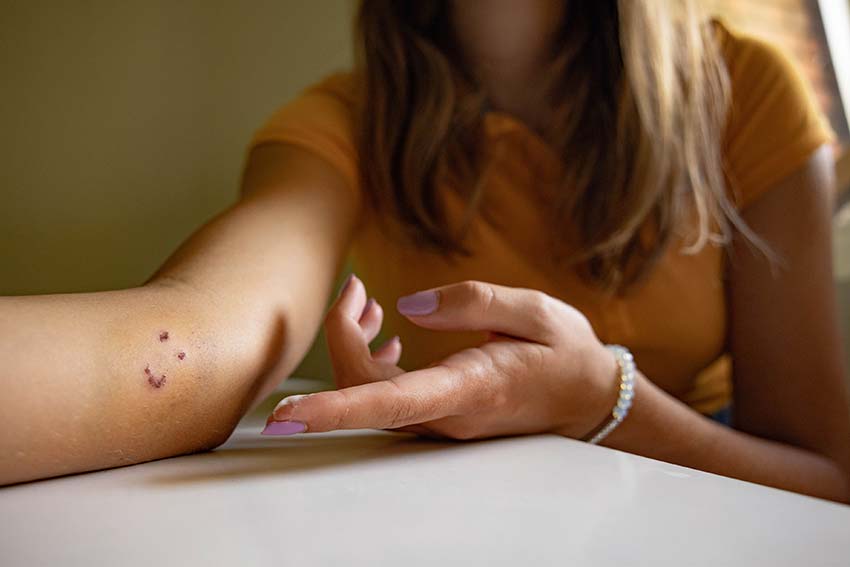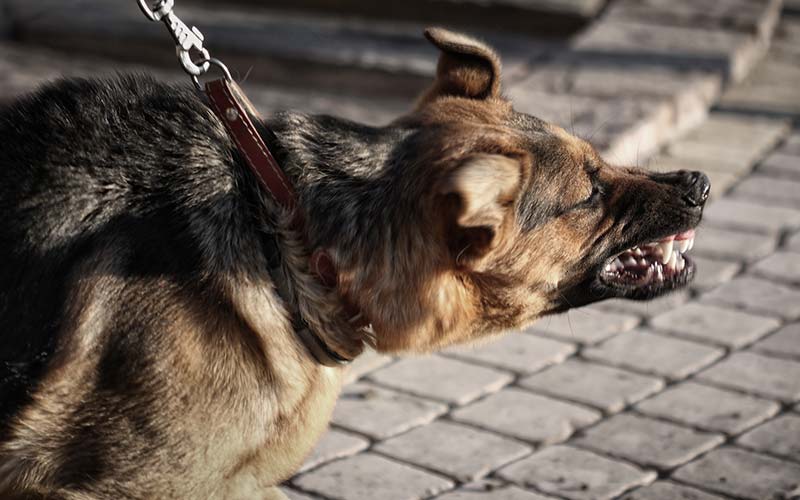Dog bites, like other animal bites, are incredibly painful and scary, yet very common. Over 500,000 dog bites are estimated to happen in Canada annually.
A dog bite can be an accident where your dog’s teeth bite or scratch you as you play. Or, it can be a more severe incident where an aggressive or unruly dog bites you.
If you or a loved one has been bitten by a domestic dog or a stray or wild animal, you might be wondering what to do after a dog bite. Bite wounds get infected easily. Therefore, it’s essential to take the proper steps to ensure your safety and that of the animal.
Even if the wound appears minor, infections or other complications can arise. Let’s look at what to do after a dog or animal bite in Ontario.

How To Treat A Dog Bite
There are many reasons why dogs might bite you, including being startled or protecting their toys, food, or pups. Also, when you approach strange animals, they might feel that their domain or territory is threatened and bite out of fear.
To prevent animal bites, it’s best to avoid approaching animals or unknown pets as temperaments vary from pet to pet. But, if you do get bitten, here are some steps to take:
Go To The Doctor
You should seek medical treatment for all dog bites and bites from stray or wild animals that have puncture wounds.
Since dog jaws are very powerful, bites can result in severe tissue tears, serious bleeding, bruising, scarring puncture wounds, tendon injury, or joint injuries. Such injuries can lead to decreased tissue function in the injured area. Therefore, seeing a doctor for injured tissue wound care is important to ensure correct healing.
If a wild or stray animal has bitten you, see a doctor as soon as possible for antibiotics and a tetanus shot if needed.
A doctor might recommend a rabies shot depending on a dog’s rabies vaccination history or the wound’s location.
Wild animals and some dog breeds may cause deeper wounds requiring surgery and stitches.
Once you’re out of the hospital, keep the wound covered with a clean dressing, and check it regularly for signs of infection, such as redness, swelling, pain, or pus.
First Aid For Dog Bites
If you’re not near a hospital, you can apply first aid to the affected area before seeking medical treatment. Here are a few steps for first aid for dogs or stray animal bites:
Ask for Vaccination History
Move away from the dog to avoid being bitten again. Once the dog is calm, ask the owner if the dog is up to date with rabies vaccination. Also, ask for the owner’s telephone number and the vet’s contact information.
Document Everything
According to Ontario’s Dog Owner’s Liability Act, the owner of the dog who bit you is liable for all damages incurred by the bite. This includes medical costs, lost wages, and pain or suffering. Therefore, ensure that your doctor documents everything about your injury to build a strong case for compensation. Take photos of the bite as well for evidence.
If the owner is not around, ask those who witnessed the bite if they know the owner and the breed of the dog. This information might help trace the animal in case it runs away.
Assess the Wound
Check how severe the bite is. Wash the area with warm water and soap if you don’t see any puncture wound. Then apply antibiotic ointment to the area as a precaution.
Seek immediate medical treatment for deep or extensive bites.
Wash the Wound
Wash the wound with mild soap and warm water if it’s small. Dogs and other animals have bacteria and other infectious organisms in their mouths.
An animal bite that punctures the skin might introduce these bacteria to your skin. To flush them out, gently press on the wound while washing it to promote bleeding.
After washing, pat the wound dry with a clean cloth and cover it with a sterile bandage.
Control the Bleeding
Deeper puncture wounds might cause serious bleeding. You can control the bleeding by gently applying direct pressure on the wound with a clean cloth or sterile bandage. Then seek medical attention so that a doctor can properly treat the wound.

When To Call Animal Control
Call the local emergency number or animal control if you’re bitten by:
- A stray or wild animal
- An unknown animal that you suspect is carrying rabies
- An animal that’s acting strangely or has a history of biting
Possible Complications Of Dog Bites
Dog bites, like most animal bites, come with possible risks of infection and complications. Even with treatment, infections can develop later due to bacteria that might have been in the dog’s mouth during the bite.
Scarring
Dog bites that tear the skin cause scarring, puncture wounds, tendon or joint injuries, and tissue tears. Mild scarring tends to disappear over time. However, more serious ones may require surgery or other treatments to reduce their impact on your appearance.
Infection
The risk of infection is high in bite wounds. Dogs’ mouths have several types of bacteria, including:
- Pasteurella
- Staphylococcus
- Streptococcus
Bites can introduce these bacteria directly into the skin. That said, most bites heal without developing an infection.
To prevent infection, see a doctor and get a course of antibiotics as soon as possible after being bitten. The doctor will clean and treat any exposed tissue before bacteria enter the wound.
Rabies
In Ontario, rabies is uncommon but could still be contracted from a dog bite. If you suspect the dog who bit you has rabies, seek medical attention immediately and request a rabies shot.
Muscle And Nerve Damage
An animal bite might damage the muscles, blood vessels, and nerves under the skin. Even some minor bites pose a serious risk of damage. Such muscle and nerve damage can result in pain, swelling, and decreased range of motion.
Death
Cat bites, dog bites, and most other animal bites rarely cause death in adults in Ontario. However, children, senior citizens, and those with weakened immune systems might be more vulnerable to death by septic shock from extensive bites.
Final Thoughts
Because a serious infection can arise from an animal bite, you should visit a medical center or emergency room immediately. Visiting a doctor on time for injured tissue wound care can reduce potential long-term complications from unknown pet bites.
If you have been bitten by a dog, it is your right to take action against the owner and receive compensation for your injuries. At Fosters Law, our team of personal injury lawyers is ready to help you with your dog bite claim. Get in touch today.




